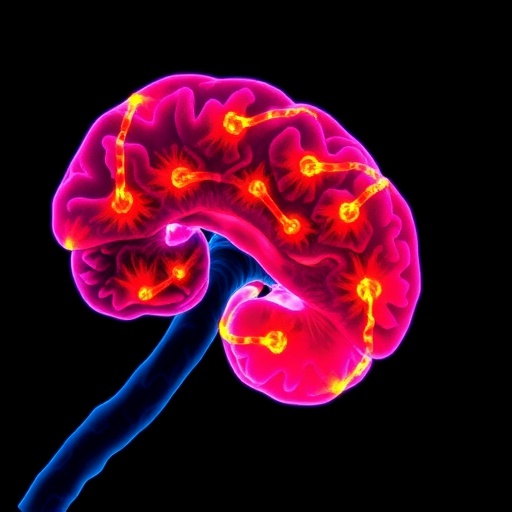Recent advancements in genetic research are shedding light on complex diseases, and a notable contribution comes from the work of Fadaie and colleagues, who have conducted a detailed study on Tuberous Sclerosis Complex (TSC). This genetic disorder is characterized by the growth of benign tumors in various organs, leading to significant health complications. In their groundbreaking article, the researchers focus on a novel frameshift deletion pathogenic variant in the TSC2 gene, an essential component in the understanding of TSC. Their research harnesses the power of exome sequencing and molecular dynamics simulations to illustrate the mechanisms behind this genetic aberration.
Tuberous Sclerosis Complex is a genetic condition that is often underdiagnosed due to its variable manifestations and presentations. It can affect individuals differently, with symptoms ranging from skin abnormalities and seizures to developmental delays and organ dysfunction. Central to the pathogenesis of TSC is the TSC1 and TSC2 gene pair, which produce proteins that help control cell growth and proliferation. Mutations in these genes often lead to the unregulated cell growth characteristic of the tumorous lesions seen in TSC patients.
The study conducted by Fadaie and team fundamentally changes our understanding of TSC variants. Through the innovative application of exome sequencing, the researchers identified a frameshift deletion variant in the TSC2 gene that was previously undocumented. This particular mutation results in a significant alteration of the gene product, which has cascading effects on cellular signaling pathways involved in growth and proliferation. The researchers demonstrate that this deletion disrupts normal protein folding and function, leading to the phenotypic manifestations seen in TSC.
In addition to the novel variant discovery, the use of molecular dynamics simulations in this study provides a dynamic view of how genetic mutations can affect protein structure and function. By simulating the interactions and movements of molecules at an atomic level, the researchers were able to predict the structural consequences of the frameshift deletion. These simulations indicated significant alterations in the protein structure that could impair its regulatory role in the mTOR signaling pathway, a critical pathway in cellular growth and metabolism.
The implications of this research go beyond mere identification of a variant; they represent a crucial step toward precision medicine in TSC. With the detailed molecular characterization provided by the study, clinicians may soon have additional tools for diagnosis and treatment. Understanding the specific mutations that drive disease can allow for the development of targeted therapies, enhancing treatment efficacy and patient outcomes. The integration of genetic data with clinical practice is poised to revolutionize the way TSC is managed.
Furthermore, this research underscores the importance of exome sequencing in rare genetic diseases. The ability to identify specific mutations provides new avenues for diagnostic testing and genetic counseling. Families affected by TSC can benefit from genetic insights, as this information can aid in recurrence risk assessments and informed family planning decisions. The emotional and psychological burdens of such diagnoses can be alleviated through better understanding and communication of genetic risks.
As the field of genetics evolves, studies like that of Fadaie et al. pave the way for further exploration into the complexities of other genetic disorders. This research not only highlights the necessity of comprehensive genetic analysis but also reinforces the importance of interdisciplinary approaches combining genetics, molecular biology, and bioinformatics. The collaboration between these fields can accelerate discoveries and deepen our comprehension of genetic diseases.
In summary, Fadaie and colleagues have made a significant contribution to the existing body of knowledge surrounding Tuberous Sclerosis Complex. Their discovery of a novel frameshift deletion variant in the TSC2 gene, coupled with innovative molecular dynamics simulations, illustrates the intricate ties between genetic mutations and their biological consequences. By bridging the gap between genetic research and clinical practice, this study provides a roadmap for future endeavors in precision medicine for TSC and similar disorders.
As awareness grows about Tuberous Sclerosis Complex and the variants that govern its pathology, it is crucial for researchers and clinicians alike to remain vigilant. The continued exploration of genetic variants will enrich our understanding of the underlying biology of TSC, ultimately leading to improved therapeutic strategies. The momentum gained from such studies encourages ongoing research, potentially unveiling further mutations and contributing to a comprehensive genetic landscape of TSC.
In closing, the research led by Fadaie et al. serves as a vital reminder of the importance of genetic investigation in understanding complex diseases. As we look to the future, the integration of cutting-edge technology, like exome sequencing and molecular dynamics, will undoubtedly play a pivotal role in elucidating the mysteries of genetic disorders. Such advancements hold the promise of unlocking new treatment avenues, where personalized medicine becomes a reality for individuals affected by TSC. This research not only advances our knowledge but also ignites hope for future therapies tailored to the unique genetic profiles of patients.
Subject of Research: Tuberous Sclerosis Complex and TSC2 Genetic Variants
Article Title: Novel Frameshift Deletion Pathogenic Variant Characterization in Tuberous Sclerosis-2 Using Exome Sequencing and Molecular Dynamics Simulation
Article References:
Fadaie, M., Biglari, S., Vahidnezhad, H. et al. Novel Frameshift Deletion Pathogenic Variant Characterization in Tuberous Sclerosis-2 Using Exome Sequencing and Molecular Dynamics Simulation.
Biochem Genet (2025). https://doi.org/10.1007/s10528-025-11269-y
Image Credits: AI Generated
DOI: https://doi.org/10.1007/s10528-025-11269-y
Keywords: Tuberous Sclerosis Complex, TSC2, frameshift deletion, exome sequencing, molecular dynamics simulations, precision medicine, genetic variants.
Tags: advancements in understanding TSCexome sequencing in genetic researchframeshift deletion mutationsgenetic disorders and tumor growthimplications of genetic research on TSC treatmentmechanisms of Tuberous Sclerosis pathogenesismolecular dynamics simulations in geneticsTSC1 and TSC2 gene functionsTSC2 gene pathogenic variantsTuberous Sclerosis Complex mutation analysisunderdiagnosed genetic conditionsvariable manifestations of TSC





